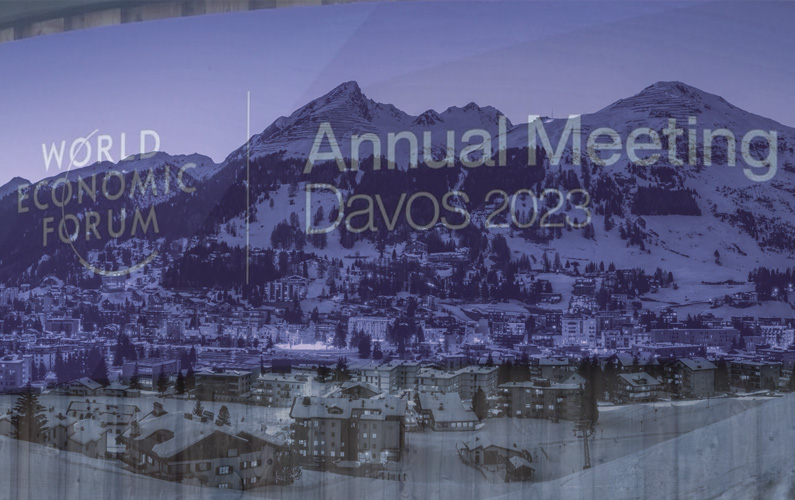- The World Economic Forum’s first winter meeting in Davos since 2020 saw several recurring themes in the global media coverage, ranging from the state of the global economy to the potential for technology and innovation as a force for good.
- Our media analysis found that while some positive economic data resulted in cautious optimism among world leaders, PR pros will still have to deal with growing consumer pessimism.
- We also found that generative AI tools such as ChatGPT replaced crypto as the hot tech topic, while companies face more challenges over their sluggish climate efforts.
View a one-page infographic summary of the analysis
For decades, business leaders, billionaires and politicians have gathered in Davos, Switzerland under the banner of forging ties that can help solve global problems. It’s a glitzy exercise often criticised as out of touch.
This year’s World Economic Forum, hosted in the Alpine ski town since the early 1970s, drew a record number of attendees. Yet the WEF’s first winter meeting in Davos since 2020 came as economic heavyweights are playing by different rules, with companies moving supply chains closer to home, strategic stockpiling picking up pace and corporate executives who once extolled free trade appearing increasingly wary of rising geopolitical risks.
A good understanding of the issues discussed at the summit may help PR and comms professionals gauge a measure of where global conversations are headed in near future. To see what stood out this year, we analysed 1,248 English-language articles published in the last 30 days. Here are our main findings:
1. The economic doom and gloom narrative may be refreshed…
The big stories coming out of Davos this year were full of phrases like “fragmenting global economy,” “economic uncertainty” and “the year of inflation.” This is what made the Global economy the most widely discussed topic at the summit:
However, gloom and doom heading into Davos turned into cautious optimism by the end with the global economic outlook for the year ahead looking better than feared. Many bigwigs said economic expectations are improving from the train wreck they feared amid high inflation and slowing growth.
The outlook among global leaders ranged from cautiously optimistic to unapologetically positive. Attendees were cited as talking about the reopening of China, the warmer-than-expected winter, which has helped keep energy prices down, and the expected surge in other commodity prices that hasn’t occurred.
This is an interesting turn of the tide in the recent narrative around the economy. Inflation in the last months has been what Covid was in 2020 – it gave rise to many scary media stories and dominated the conversation around every industry. PR and comms teams should keep track of how this economic narrative evolves and be aware of the trends in the economic metrics. Without the right information and a considered approach, your stories around the price of your products and services will not resonate.
2. …but PR pros will have to deal with growing consumer pessimism
Despite the cautious optimism expressed by global leaders, Davos also told another story. A widely cited PwC survey found that confidence among companies in their growth prospects has dropped the most since the 2007-08 global financial crisis. With 73% of chief executives around the world expecting global economic growth to decline over the next 12 months, this gloomy view was the most pessimistic CEOs have been since PwC began the survey more than a decade ago.
Commenting on these results was what made PwC Global Chairman Bob Moritz the most influential corporate spokesperson in the debate:
Perhaps more interestingly, the second most influential spokesperson came from the PR industry. Richard Edelman, CEO of Edelman, was commenting on what will present perhaps the biggest challenge to PR pros in near future – consumer negativity.
Feelings of pessimism and alienation from the global economy as well as growing rancour against big institutions are filtering into households of every income level, according to Edelman’s Davos report on trust in institutions.
The report, which Edelman has conducted annually for more than two decades, found that economic optimism is at “all-time lows” in 24 of the countries surveyed, with all but one country reporting lower optimism, while public polarisation in democracies is growing and trust in institutions including government and media is falling.
But, as Richard Edelman put it, it’s at this moment that businesses should continue their role as a leading force for change on societal issues, partnering to create solutions, using ESG as its guidepost, soliciting views of consumers and employees and providing value for a broader set of stakeholders as a North Star.
3. Generative AI replaced crypto as the hot tech topic
Crypto firms took over at Davos last year, but were less present now, since the market wipe-out of 2022 — with the exception of a lone flashy orange bitcoin car.
Our media analysis showed that this year, WEF couldn’t get enough of a new development in the realm of artificial intelligence: generative AI.
Generative AI virtually replaced crypto and the so-called “Web3” as the hyped technology of choice for top business executives and policymakers. And it was all because of the surging popularity of text-generator ChatGPT, used to generate everything from college essays to works of art.
Some journalists remarked that generative AI has captured the public imagination in a way that no technology has since the arrival of the iPhone in 2007. Optimists at Davos saw a world in which AI gives superpowers to knowledge workers and speeds the time needed to achieve breakthroughs in health and sustainability.
But there were also concerns ranging from the inevitable flood of AI-generated misinformation to the biases baked into systems that have been trained on real-world data that’s filled with stereotypes and dominated by rich countries.
And when Microsoft announced it’s going to make ChatGPT available on its platforms soon, it became the most influential company in the Davos debate. We determine an organisation’s media impact in the context of a topic by looking at its media influence score calculated in terms of coverage by high-profile media outlets, topic relevancy score measuring its contextual relevance, and media visibility as measured by the number of mentions.
But many media outlets noted that Davos juxtaposed the tech industry’s potential and peril. Just as Microsoft’s CEO Satya Nadella and other Silicon Valley executives touted artificial intelligence’s potential to transform their businesses, they announced layoffs of tens of thousands of employees globally. Scrutiny of once high-flying cloud spending by businesses was at the forefront.
4. Climate pledges haven’t been helping
A return to Davos by corporate titans and their bankers after recent record Alpine temperatures has turned a spotlight on just how quickly they are moving to rein in carbon emissions.
The main climate message coming from the conference was that despite the strong growth in pledges (the number of organisations pledging to get to net-zero emissions by mid-century has soared in recent years, up 60% to more than 11,000 in September 2022), the world was on course to miss its goal of capping global warming at 1.5 degrees Celsius above the pre-industrial average, heading instead towards 2.8 degrees.
Many officials gave a fresh warning about the dangers of shoddy corporate efforts to get to net-zero emissions, and called for faster action. While there was agreement on the need for change, people were divided on the pace.
And climate activist Greta Thunberg again made headlines by calling on the global energy industry and its financiers to end all fossil fuel investments.
Another big theme around climate change was the process of decarbonisation industries and the energy transition. Investment in and the scaling up of new technologies, including more sustainable fuel sources, was a particularly pronounced topic, with green hydrogen becoming a big buzzword this year.
The prevailing sentiment was once again that business must show, not tell. As André Hoffmann, vice chairman of Roche, put it, people have realised that it is something that’s not just a way of presenting things, but that it is a necessity for survival.
5. Youth activism enters a new era
Young leaders from the organisation Global Shapers – a network of more than 10,000 young people that published the world’s first youth-driven pandemic recovery plan– were reported to have shaken up Davos this year, with their opinions on resilience and innovation being increasingly featured alongside experts and business leaders at the summit.
Global Shapers’ participation at Davos made a number of journalists talk about a new era of youth activism. Some remarked that while activism has long been synonymous with youth culture and Gen Z is the latest chapter in the decades-long encyclopaedia of young activists, this cohort appears to communicate, mobilise and rally support in a way that sets them apart from the generations before them.
Fuelling Gen Z’s anxiety is the fact that they are exposed to news in a different way than their parents or grandparents at the same age; young people are consuming content around social issues and events almost constantly.
Gen Z activists and their older peers are united in their concern over the same issues – climate destruction, gender equality, LGBTQ+ rights – but their voices appear louder and more urgent because they have more ways to source inspiration, disseminate information and mobilise. While older generations set the precedent for grassroots activism and in-person demonstrations, Gen Zers have brought this activity into where they are most comfortable: digital spaces.
From promoting equity and dignity in the workplace to achieving environmental justice and responsible technology governance, it’s past time for PR and comms teams to learn from their leadership and collaborate with them.

